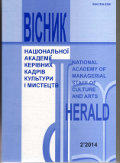EVOLUTION OF P.O.KULISH HISTORICAL VIEWS
DOI:
https://doi.org/10.32461/2226-3209.2.2014.137950Keywords:
outlook, Ukraine Cossack history, educational activities, subjective concept, the struggle for Ukrainian language Ukrainian literature development, dissemination of historical knowledge, ideological principlesAbstract
The article states that the analysis of letters, diaries, journalistic, literary and historical works P.Kulish and investigative documents show that its ideology, views on social and political processes, historical events and varied events throughout life, evolving in toward the conservative tradition.
In forming the ideological basis of the researcher, historian and writer can distinguish three stages.
The first phase – 30-50-ies of the XIX century. At this stage, we believe that the ideological outlook of the researcher shaped by political secret circleKharkovUniversityand Nijinsky high school science, the rise of the Polish liberation movement and its distribution inUkrainein the 30s of the XIX century. Emergence of political circle Petrashevists inSt. Petersburgand Cyril and Methodius inKiev; formation centers of education, science and culture ofUkraine.
Under the influence of these and many other factors in P.Kulish formed young romantic progressive outlook, full of love for the homeland, its history, native words with a sincere belief that the situation in Ukraine can be changed for the better, if at all this work together to tackle. In fact, this desire led to the introduction P.Kulish Cyril and Methodius, which later he strongly refused.
Kulish was convinced that the history of Cossack Ukraine could revive the past, using her experience in modern life, and above all by the general educational activities to achieve the overthrow of despotism and feudal reality.
The second stage – the 60 – early 70- ies of the XIX century. Back in the late 40-ies of XX century gendarmes third division, using investigative findings in 1847, managed to scare P.Kulish break his desire to participate in political clubs and organizations.
In a letter to O.F.Orlova Kulish says that he will do everything possible to transform.
Under the oppressive influence Valuev Circular 1863, fearing persecution gendarmerie, P. Kulish starts again denied any involvement in the Cyril and Methodius. In addition, it revises its views on the role and place of the Zaporozhian Sich inUkraine’s history, the historical conditions that gave rise to peasant and Cossack movement in the late XVI – early XVII century. Revolutionary events of 1648-1676 years.
Not being in solidarity with the revolutionary-democratic movement II floor. XIX century, Kulish criticized the revolutionary foundations of Shevchenko’s poetry, some historical position M.Maksymovych, M.Kostomarov and other authors.
During this period Kulish base its activities only puts educational movement, fighting for their own language, the development of Ukrainian literature dissemination of historical knowledge.
The third stage – the second half of the 70th – 90th years of XIX century. During this period of ideological principles Kulish became somewhat confused and ambiguous character. In scientific journalistic and artistic works of these years Kulish regrets that Ukrainian bottoms were unable to coexist peacefully as part of Polish civilization in the XV-XVII centuries and sometimes showed unjustified violent actions against the Polish administration and property classes. For P.Kulish ideal during this period was the work of the Russian monarchical governments, especially Peter I, Catherine II and the kings of the later period.
Therefore, Panteleimon Kulish was dramatically contradictory personality, as rightly pointed M.Zhulynskyy, its changing political orientations outraged the public, especially those who tried to imitate his great cultural asceticism.
Downloads
Published
Issue
Section
License
Authors who publish with this journal agree to the following terms:
1. Authors retain copyright and grant the journal right of first publication with the work simultaneously licensed under a Creative Commons Attribution License that allows others to share the work with an acknowledgement of the work's authorship and initial publication in this journal.
2. Authors are able to enter into separate, additional contractual arrangements for the non-exclusive distribution of the journal's published version of the work (e.g., post it to an institutional repository or publish it in a book), with an acknowledgement of its initial publication in this journal.
3. Authors are permitted and encouraged to post their work online (e.g., in institutional repositories or on their website) prior to and during the submission process, as it can lead to productive exchanges, as well as earlier and greater citation of published work (See The Effect of Open Access).


